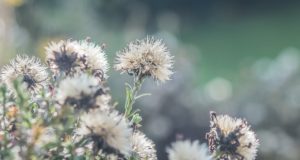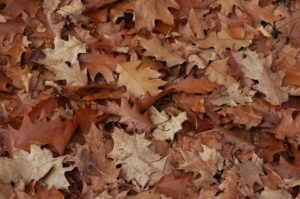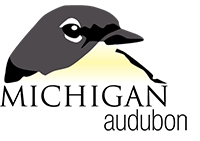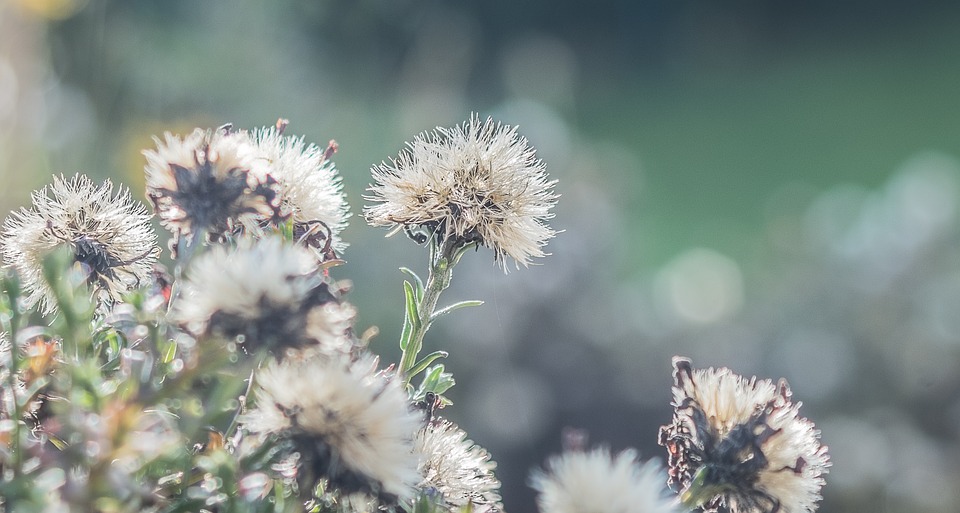The leaves are falling, flowers are seeding, and it’s time for fall clean-up. But what is the best way to clean up your garden? Many people have their own ideas for what a garden clean-up should look like. For your benefit and the benefit of wildlife, I’d like to make a case for a “messy” fall garden.
Many forms of wildlife can utilize our yards and gardens during the winter months. Cover, structure, and seeds are crucial to several species during the fall and winter. Here are a few dos and don’ts to help birds and other wildlife.

Aster seedheads.
Don’t cut back your plants.
Seed heads are a huge food source for migrating birds and residents. Seeds can be left from flowering plants and grasses to maximize good sources. Standing plant matter can also create a safe place for bees to harbor in the stems. Tall plants also make for great roosting spots for birds and offer protection and shelter for small mammals.
Chickadees, finches, jays, nuthatches, sparrows, cardinals, and grosbeaks, among other seed-eating birds, feast on dead seed-filled flowerheads from messy gardens. Some native plants packed with seeds include asters, coneflowers, Coreopsis, and sunflowers. Grasses may also be left to grow to seed and provide even more sustenance for resident birds.
Build a brush pile.
Brush piles create a protective cover for birds, insects, reptiles, amphibians, and mammals. Birds need places to rest that are not out in the open. During the winter months, without leaf cover, brush piles can be one of the best options. Brush piles can provide cover for escaping predators, rest, sheltering from bad weather, and feeding. This is also a great place for bees, butterflies, and other insects to find places to burrow and overwinter.

Leaf litter provides protection for numerous animals in the winter.
Don’t remove all leaves.
Leaves also provide cover and protection for insects throughout the winter. Bees, butterflies, and other insects will use the leaf litter for warmth and protection while overwintering in our yards and gardens. If you’re worried about the health of your lawn, it’s suitable to remove some of the leaves or to create small piles on your property. It’s also a good idea to mow over leaves in the early fall to help break them into smaller pieces that can still offer some protection while also protecting and nourishing the grass.
Many predatory invertebrates, including assassin bugs, praying mantises, lacewings, wolf spiders, damsel bugs, and ladybugs, utilize leaf litter to burrow beneath for the winter. These insects and arachnids are considered beneficial and will help minimize pest infestation in the early spring.
Leave snags standing.
Snags — dead trees left standing to decompose naturally — offer multiple advantages for wildlife. They provide food, shelter, and space for a variety of animals and invertebrates. Many animals, including birds, bats, and mammals, use cavities within snags for nests. They may also use them for roosting space, in addition to branches that protrude from the snag. This is critical for the birds, in particular, to have a comfortable space to rest. Snags can also provide habitat and protection for insects within loose bark. This, in turn, provides a food source for birds and other animals. Snags can also be a great place for birds or squirrels to hide or cache food for the winter.
Snags are a critical piece of habitat and should be left in yards when it is safe to do so. Over time, these snags may fall and turn into another form of habitat closer to the ground. They would also make a great addition to your brush pile when no longer standing.
Don’t use chemicals.
For obvious reasons, chemicals are not helpful for the variety of wildlife that may use your garden space during the fall and winter. Chemicals can harm insects that have taken shelter, birds eating seeds, or even mammals foraging through the snow.
Many experts suggest waiting until the spring when there have been several days at 50-degree temperatures to thoroughly clean-up plant material in your yard and garden. This offers enough time for any of the insects overwintering to emerge and move on before they are forcibly removed. This also offers some time for the beginning of migratory birds to get the last of what your garden has to offer.
Although social norms may suggest that we should have clean and manicured gardens and yards, the wildlife in your area will benefit from a messier approach. Feel free to put down your garden shears and rakes and enjoy what your unkempt garden has to offer. You may find that keeping a messy garden full of wildlife is much more satisfying than maintaining a well-manicured one.

